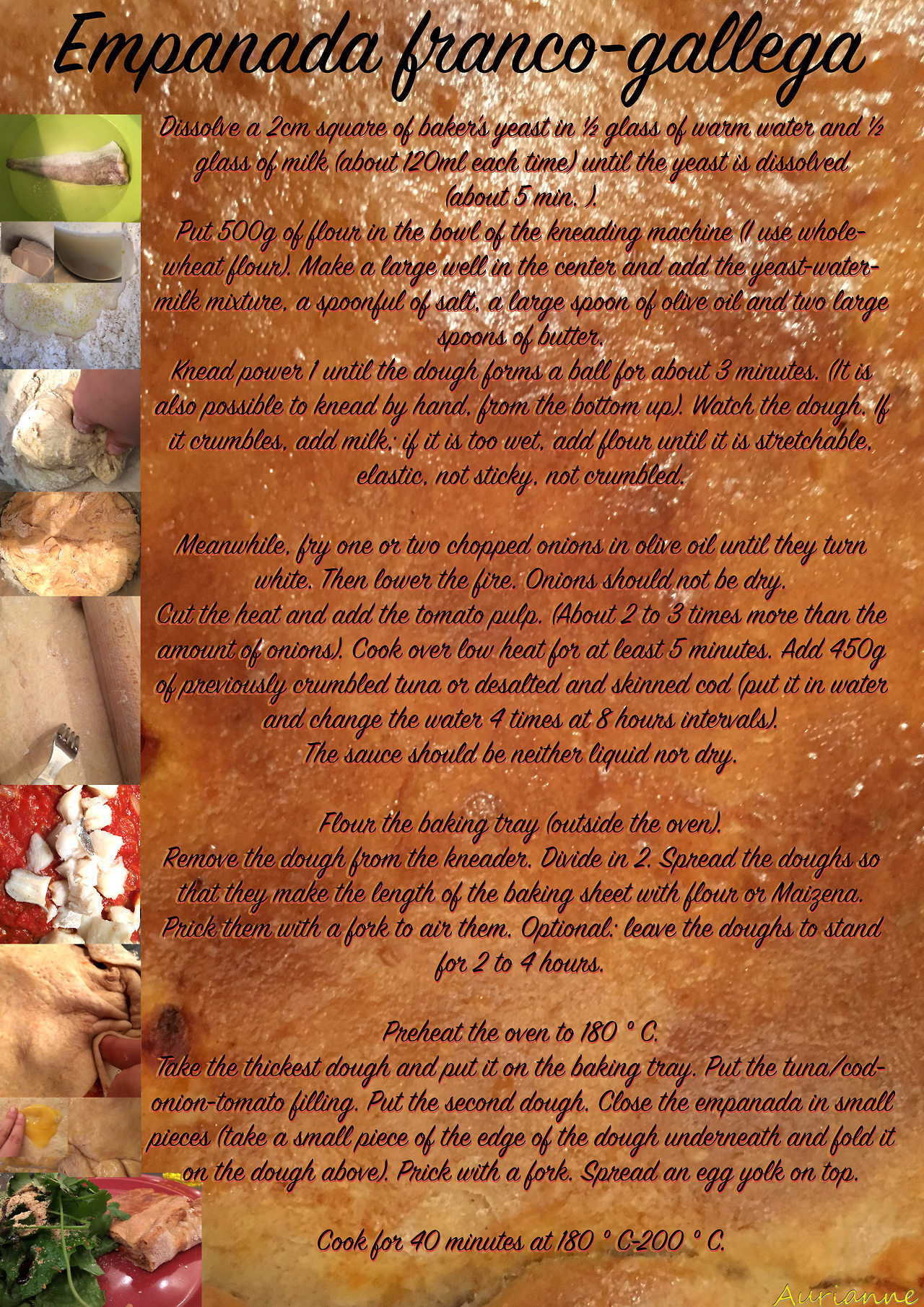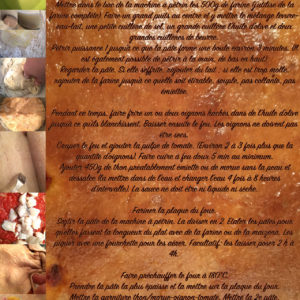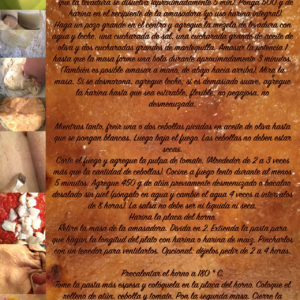I am French. I do not even have dual citizenship. And yet, the empanada gallega has a very special meaning for me. This is the dish of my childhood. The one my abuela always cooked for our arrival in Galicia. She cooked it a second time for pleasure and a third time for us to snack on the bus that would take us back to France. When she was young, she prepared it for my abuelo, who went at sea; fishing for cod.
There was an empanada cooking contest in the park close to her home; some fashioned them in the shape of a house or boat. A jury elected the best empanada then the public could taste the different bacalao empanadas, of course they were all made with cod. There were also traditional dance and music demonstrations, which I liked very much, but the rest of the family focused more on their stomachs.
Every year, we found that abuela’s was much better but she always refused to participate in the contest claiming that her oven was not big enough.
As soon as I was old enough to cook, I wanted to know how to cook the famous dish. I did not understand the mixture of Galician and Spanish my abuela used to babble, not knowing the difference between the two languages; and my Spanish was not good enough to understand the translation by my aunt who was issuing an incredible number of instructions at lightning speed. Whether my abuelita or aunty, they went too fast, without measuring anything, without weighing anything. Everything was done in the eye, and, what was most important, in very large quantities. They explained to me in the slightest details certain parts of the recipe and then told me to leave while the dough was resting and, when I came back, everything was ready to go to the oven.
Over the years, the traditional bacalao empanada has become a tuna empanada. Now that abuelo and abuela are no longer there, it is my aunt who cooks it, inevitably. But with tuna, she likes it best. She says the recipe is the same for tuna or cod.
I never really managed to do the same. But after all, that’s cooking and that’s also cultural exchange. I give you here the recipe that I came up with at the end of all these years. The expression home-made here takes all its meaning. This recipe is not authentic, but it’s mine and I always do it with great love, in French quantities and thinking of my Galician family. And my husband prefers mine; even when we go to Galicia.
After all, cooking is above all a great love story.
Franco, el gallego: https://es.wikipedia.org/wiki/Francisco_Franco
Franco the Galician: https://en.wikipedia.org/wiki/Francisco_Franco
Histoiry of Galicia: https://en.wikipedia.org/wiki/History_of_Galicia#Contemporary_Galicia
Dissolve a 2cm square of baker’s yeast in ½ glass of warm water and ½ glass of milk (about 120ml each time) until the yeast is dissolved
(about 5 min. ).
Put 500g of flour in the bowl of the kneading machine (I use whole-wheat flour). Make a large well in the center and add the yeast-water-milk mixture, a spoonful of salt, a large spoon of olive oil and two large spoons of butter.
Knead power 1 until the dough forms a ball for about 3 minutes. (It is also possible to knead by hand, from the bottom up). Watch the dough. If it crumbles, add milk; if it is too wet, add flour until it is stretchable, elastic, not sticky, not crumbled. Optional: leave the dough to rise for a few hours or even overnight.
Meanwhile, fry one or two chopped onions in olive oil until they turn white. Then lower the fire. Onions should not be dry.
Cut the heat and add the tomato pulp. (About 2 to 3 times more than the amount of onions, approximately 200 g). Cook over low heat for at least 5 minutes. Add 450g of previously crumbled tuna or desalted and skinned cod (put it in water and change the water 4 times at 8 hours intervals).
The sauce should be neither liquid nor dry.
Flour the baking tray (outside the oven).
Remove the dough from the kneader. Divide in 2. Spread the doughs so that they make the length of the baking sheet with flour or Maizena. Prick them with a fork to air them. Optional: leave the doughs to rise for 2 to 4 hours.
Preheat the oven to 180 ° C.
Take the thickest dough and put it on the baking tray. Put the tuna/cod-onion-tomato filling. Put the second dough. Close the empanada in small pieces (take a small piece of the edge of the dough underneath and fold it on the dough above). Prick with a fork. Spread an egg yolk on top.
Cook for 40 minutes at 180 ° C-200 ° C.





